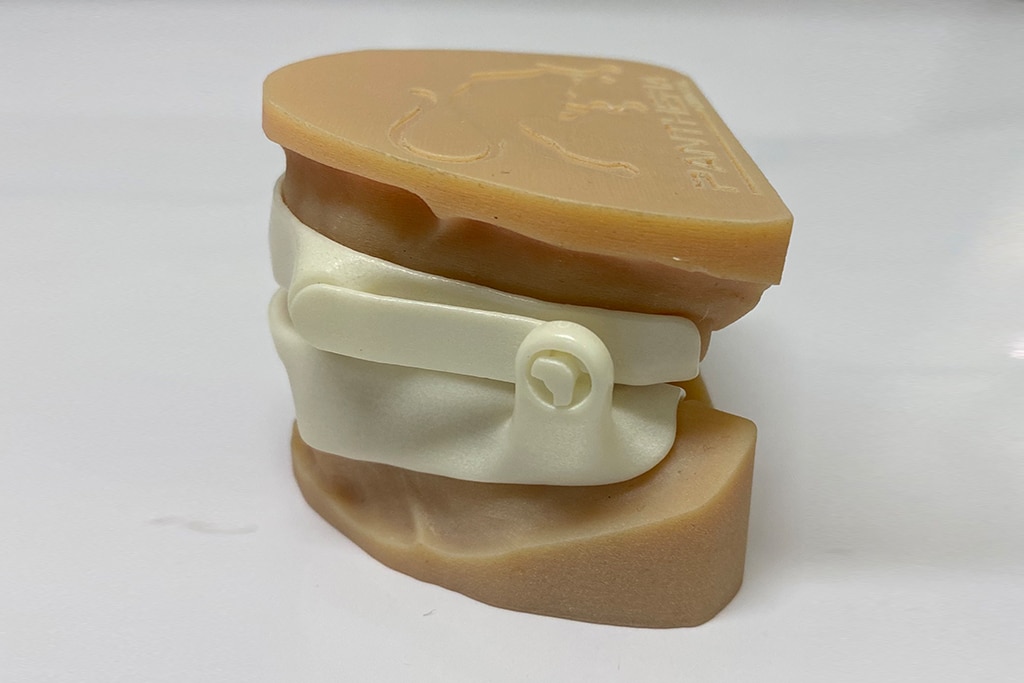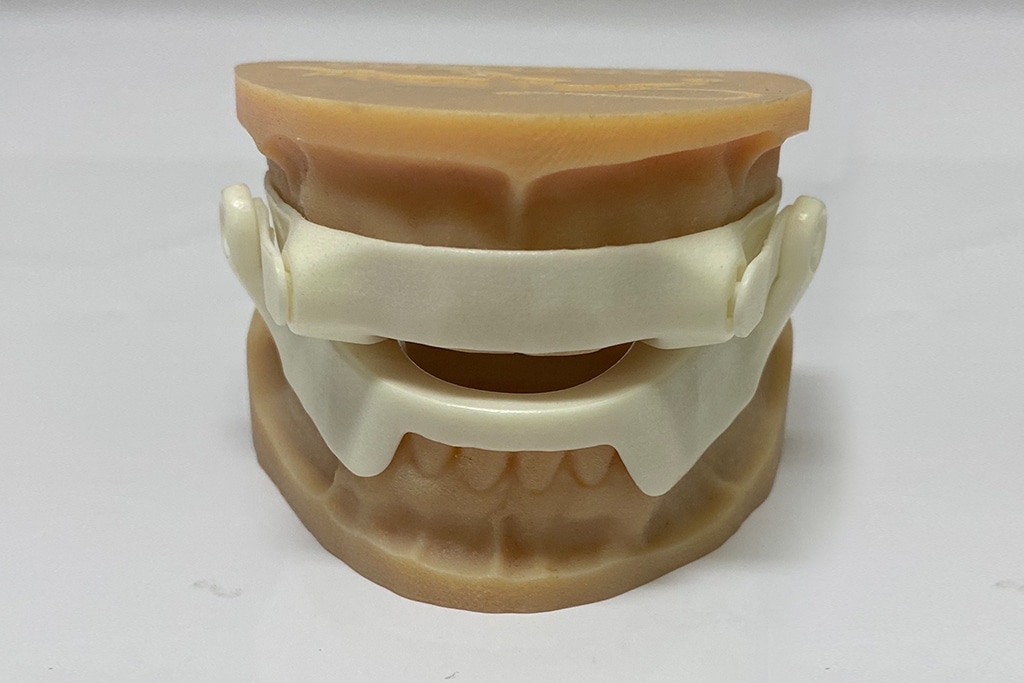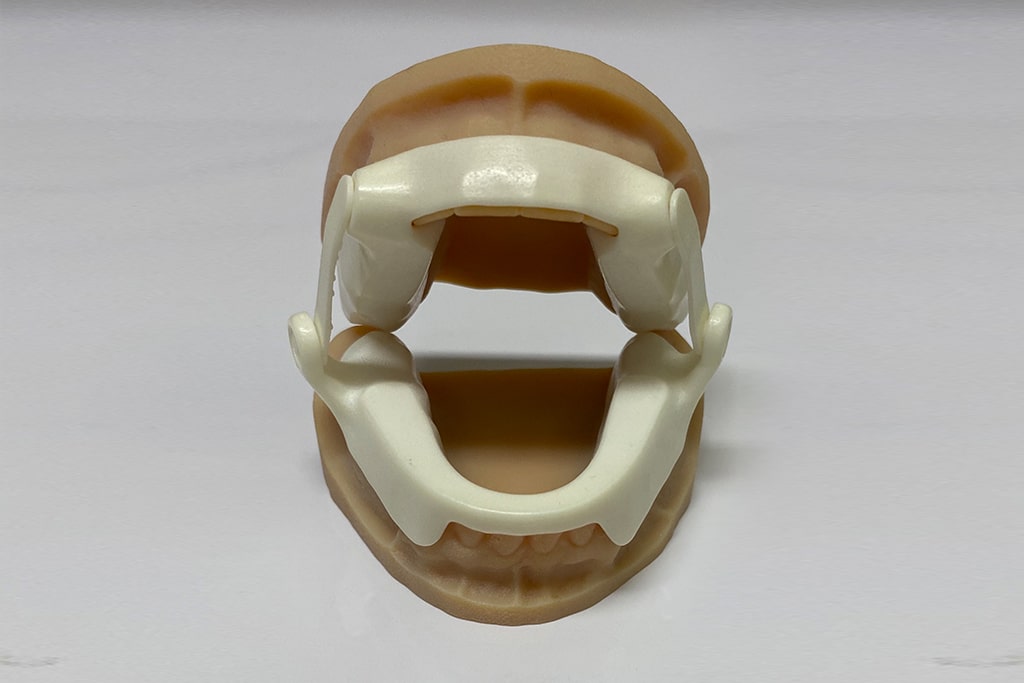Loud snoring during sleep can disrupt a good night’s rest, not only for you but also for someone you love. Understandably, chronic snoring is a problem that needs to be resolved. From a medical standpoint, snoring also presents several serious concerns. If you or someone you love snores nightly and is struggling with other symptoms, such as forgetfulness or excessive daytime fatigue, you may want to explore the possibility that they may be suffering from sleep apnea. Dr. Slepchik and his highly accredited staff have a lot of experience working with patients who suffer from sleep apnea.

COVID-19 Impact on CPAP Machine
During this period of COVID-19, it is imperative to keep in mind that the CPAP (Continuous Positive Airway Pressure) device creates air pressure that will spread bacteria. If you have tested positive for COVID-19 while wearing your device, you will spread bacteria to your partner. You must be free of COVID-19 in order to wear it. The D-SAD does not work in the same way.
Are There Different Types Of Sleep Apnea?
There are different types of sleep apnea: obstructive sleep apnea, central sleep apnea, and complex sleep apnea. Dr. Slepchik provides treatment for obstructive sleep apnea.
What Is Obstructive Sleep Apnea?
Obstructive sleep apnea (OSA) is the most common form of sleep apnea.
What Causes Sleep Apnea?
The most common form of sleep apnea (and the form Dr. Slepchik treats) is known as obstructive sleep apnea. It occurs when the muscles in the back of the throat relax. These muscles support all of the surrounding tissues, such as the tonsils and the walls of the throat. When the muscles relax, the airway narrows or closes. Your brain senses this inability to breathe and briefly wakes you from sleep to reopen the airway. These lapses in sleep are usually so brief that you don’t even remember them. Actions during a lapse can involve a snorting, choking, or gasping sound and can repeat as many as 30 times per hour all night.
Sleep apnea can have various causes:
- Enlarged tonsils or adenoids
- Cardiovascular problems
- Obesity
- Throat and tongue muscles that are abnormally relaxed
- Nasal congestion
- Smoking
- Family history
How Do I Know If I Have Sleep Apnea?
There are several indications that a person may have sleep apnea. Some may only be noticed by a partner or loved one who sleeps next to the affected person. A person with sleep apnea may exhibit the following symptoms such as:
- Loud snoring
- Momentary pauses in snoring, which indicate a lack of respiration
- Restless sleep
- Significant daytime sleepiness, difficulty staying awake
- Falling asleep at stoplights or while watching television
- Moodiness or persistent irritability
- Decreased productivity
- Increased clumsiness and accidents
- Problems with anxiety or depression
- Diminished personal relationships
- Morning headaches and sore throat
When Should I See Someone About My Sleep Apnea?
We all have problems sleeping from time to time. However, certain signs indicate you may have not just occasional insomnia but sleep apnea.
- You regularly experience difficulty sleeping
- You are often tired during the day, even if you slept for at least seven hours the night before
- You have a reduced or impaired ability to perform regular daytime activities
- Your partner has told you that you snore loudly and sometimes seem to stop breathing
There are more telltale signs as well:
- You fall asleep when driving
- You struggle to stay awake when inactive, such as when watching TV or reading
- You have difficulty paying attention or concentrating at work, school, or home
- You have performance problems at work or school
- You’re often told that you look tired
- Your memory seems to be off
- Your ability to respond seems slow
- You have difficulty controlling your emotions
- You feel the need to take a nap almost every day
If any of those characteristics sound like you, it’s probably time to be checked for sleep apnea.
What Factors Can Increase My Risk Of Sleep Apnea?
Obstructive sleep apnea relates to excess weight around the throat when muscles relax at rest. Therefore, factors that affect fatty and muscle tissue can increase one’s risk of this type of sleep apnea. Factors to consider include:
- General weight. The heavier a person is, the more fatty tissue they will have around their neck pressing against the airway.
- Neck circumference. Generally, healthy people with a large neck circumference are more likely to have excess muscle or fatty tissue around the throat.
- Naturally narrow airway. The airway may naturally be smaller or narrowed by tonsils and adenoids, glands situated in the throat.
- Age and gender factors. Studies suggest that three times more men develop obstructive sleep apnea than women. The condition also occurs more in older individuals, likely due to the decline of muscle tone that occurs with age.
- Smoking. Sleep apnea is three times more common in smokers than in non-smokers. This is due to fluid retention and inflammation in the airway.
- Sedative use. People who take sedatives as sleep aids may relax to the extent of closing off their airways. Remember, alcohol qualifies as a sedative also.
- Nasal obstruction. People with a deviated septum or chronic nasal congestion are more likely to develop sleep apnea.
How Is Sleep Apnea Diagnosed?
A doctor may diagnose sleep apnea during a comprehensive consultation and discussion of symptoms. The suspected diagnosis, along with the type of sleep apnea a person has, is confirmed through a sleep study. Home sleep studies have been developed to avoid needing an overnight stay in a medical sleep center. During a home sleep study, a device records a person’s heart rate, breathing rate, and oxygen levels while they sleep.
What Sleep Apnea Treatment Options Are Available?
Historically, sleep apnea has been treated with CPAP therapy. CPAP stands for continuous positive airway pressure. This technique resolves symptoms by delivering air into the airway while a person sleeps. To achieve this, the patient must wear a face or nasal mask that attaches to a small device via a hose.
Now, many patients have been managing obstructive sleep apnea using oral appliances made by their dentist. Oral appliance therapy works by gently manipulating the lower jaw into a forward position that supports an open airway. Devices are small, comfortable, and effective at reducing or ending sleep apnea symptoms.



What Can I Do To Reverse Sleep Apnea?
Professional medical associations recommend a few strategies to help you if you suffer from sleep apnea. The consequences of untreated sleep apnea are dire, so it’s imperative that you do not wait long to receive an accurate diagnosis of your condition as well as appropriate treatment. Keep in mind that you can begin treatment, whether CPAP or D-SAD (oral appliance therapy), and stop this intervention at any time if your situation improves with changes in your lifestyle. Some of the ways in which sleep apnea may be improved include:
- Avoiding alcohol consumption and the use of sedatives, including some anti-anxiety medications. Sedatives of any kind may cause deep physical relaxation so that the airway is more likely to close while sleeping.
- Lose weight. This strategy will only work if your obstructive sleep apnea is caused by obesity. In this instance, moderate weight loss may reduce the pressure of the neck tissue on your airway during sleep.
- Exercise. Some studies suggest that, besides aiding in weight loss, regular exercise can improve poor-quality sleep and help manage your sleep apnea.
- Sleep elevated or on your side. When you sleep on your back, your tongue is more likely to block the back of your throat. Sleeping on your side might help if obesity is not a contributing factor.
- Consider nasal treatments. Depending on the factors contributing to your sleep apnea, such as nasal congestion, you might benefit from using a nasal spray or decongestant medication. This should be done under the supervision of your physician. Some medications may have a sedative effect, adding to rather than decreasing apnea episodes.
Numerous factors can cause sleep apnea. While home remedies and lifestyle changes help reduce symptoms, they do not replace a thorough clinical examination and sleep study.
What Is A Home Sleep Study For Sleep Apnea?
Today, doctors and dentists routinely prescribe home sleep studies to help them diagnose sleep apnea. These studies aren’t quite as involved as those that take place in a formal sleep lab. However, they are more convenient and more comfortable because you get to sleep in your own bed in your environment. That alone can promote deeper sleep and facilitate your test results.
A home sleep study involves applying some comfortable monitors before bed. Otherwise, you simply follow your nightly routine regarding when you go to bed and wake up.
The applied monitors measure vitals like breathing patterns, oxygen levels, and the rise and fall of your chest while you breathe. The sleep study doesn’t measure the levels of sleep, such as light sleep versus REM sleep, and how long you remain in these cycles. It focuses on your breathing parameters because it’s your breathing that indicates sleep apnea.
Understanding how home sleep studies work and what can go wrong is essential. For example, your test results may be inaccurate if even one of your sensors falls off while sleeping. As convenient and reliable as home sleep studies can be, they are not fail-proof. If your symptoms persist after a home sleep study and indicate normal breathing parameters, your doctor or Dr. Slepchik may recommend exploring additional tests.
What Our Patients Say
"I've been a patient for 30 years. Exceptional expertise. Exceptional staff. Exceptionally friendly, caring and knowledgeable. The latest appliance (Panthera) has resolved my snoring and sleep apnea issues. I now sleep through the night, waking up rested and refreshed. Thank you team Slepchik!!"
"I don’t wake up several times a night. My joint and muscle pain has stopped. The SAD is the best investment I have EVER made."
"Dr. Slepchik, I want to speak with you. Ever since I received my Sleep Apnea Device (SAD) from your office, I have more energy. I’ve been told that my snoring which had caused my partner to sleep in another room no longer exists. Thank you so much."
What Are The Side Effects Of Untreated Sleep Apnea?
Sleep apnea deprives the brain and body of necessary oxygen. It also increases the release of stress hormones on an ongoing basis. In conjunction with severe sleep deprivation, these effects of sleep apnea present serious health concerns. Untreated sleep apnea is a factor in heart disease, heart attack, stroke, and death. It is essential to find a solution to this problem.
Schedule A Consultation
Learn more about sleep apnea and how a convenient oral appliance can improve your health. Contact our downtown Montreal office at 514-875-7971 or email us at reception@smilesbydrslepchik.com to schedule a consultation appointment with Lenny Slepchik, DDS. We are located in Downtown Montreal, next to the Fairmont Queen Elizabeth Hotel across from Place Ville Marie. Metro McGill or Metro Bonaventure.
